After our disaster-filled week last August (we had an earthquake and a hurricane within a week of one another) we had several requests for a post about emergency preparedness. We hemmed and hawed because we’re no experts in that department, but then a couple of actual experts / regular YHL readers reached out to us with emails fulled of information. Phew! So without further ado (since it’s already taken me like 6 months to finally write this post), here are some of the recommendations and information they sent our way.
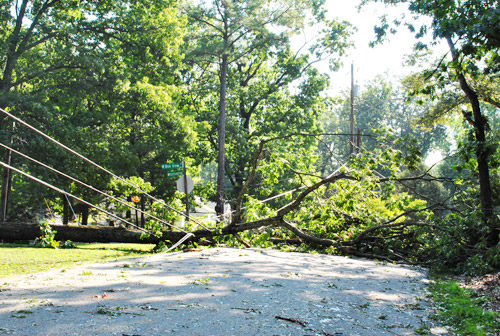
First off, our experts are Amanda F, who has her Master’s degree in this field and worked as an emergency coordinator for a hospital in LA (so she knows earthquakes). She now lives in DC, so she’s got hurricanes to deal with these days. We’ve also got Michelle O, who is the Deputy Coordinator of Emergency Management for our county. So basically these people know their stuff far better than we do. Their consensus boils down to three basic ideas: Make a kit, make a plan, and stay informed. So we’ve corralled their advice below for ya:
#1. Make A Kit – An emergency kit doesn’t need to be fancy, expensive, or overdone. Even a small kit that will last you two days is better than having none at all. There are three types of kits to consider:
- A Stay At Home Kit: Plan for three days without power. Include items like non-perishable food, water (1 gal per person per day is recommended), flashlight with batteries, extra batteries, a battery powered radio, extra batteries, manual can opener, any medical supplies or prescriptions (this includes extra glasses or contact lenses), cash (ATMs won’t work without power!) and important personal and financial documents (more on that in a second).
- A Kid / Pet Kit: If you’ve got kids or pets, plan for them too. Think of items like formula, food, diapers, toys, comfort items.
- A Go Kit: If you need to leave your home during an emergency (say it’s being evacuated for flooding or a tree has fallen on it), have a backpack ready for each person that includes water, high energy snack foods, extra clothes, and shoes.
Sherry and I actually evaluated our own emergency preparedness kit a couple of years ago (we certainly floundered in a few areas and ended up giving ourselves a B). We probably should do that again now that we’re in our new home to see if we’re more prepared.
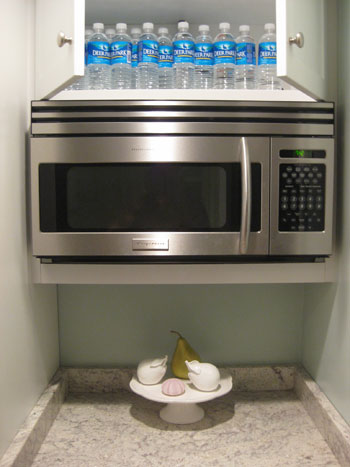
We also spotted a tip in Real Simple recently about including documents in your emergency kit. This is less about having them on hand in a disaster and more about not losing them if your house doesn’t survive the flood / earthquake / tornado / whatever. They recommend that you: “make photocopies of the following (or scan and burn to CD or flash drive) and keep one set at home in a waterproof bag and another in a safe-deposit box.”
- Driver’s license & passport
- Social security card
- Birth certificates
- Health insurance card
- Insurance policies
- Mortgage and other loan papers
- Property deeds
- Car title and registration
- Marriage license
- Your will
- Last year’s tax return
- Bank and brokerage account numbers
- Inventory and/or pictures of your home for insurance claims
Of course we all have excuses for why we haven’t put together a kit or don’t have the time or money available to get started. So here are some good excuse-busters from our experts:
- Not everything in the kit needs to be bought. Take inventory at home first – if you’ve got canned goods or cereal on hand, that counts!
- Hit up the dollar store. Both of our experts said this is a great option for stocking up. After all, you don’t need the fanciest flashlight – just a flashlight that works.
- Spread out the expense. Try assembling your kit over time. Commit to buying one or two items per month if you can’t shuck out funds for everything now.
- Involve your kids. Ask them to help you gather items or pick out a supply to buy each month. This also gives you a natural opportunity to teach them why that item is important and how to use it.
- Don’t stress over space. Kits can be pretty small, so finding some space in your house for them shouldn’t be too tough (make sure they’re stored in an easily accessible space, not in the shed behind the house). Water storage can be the biggest challenge, but do what you can. Anything is better than nothing.
- Shop in one place. Since camping needs tend to be similar to emergency needs, hit up a camping or outdoors supply store for an easy way to stock up on items.
- Buy your kit. If time (not money) is your barrier, you can buy a pre-assembled it. Here are a bunch of options sold by the Red Cross.
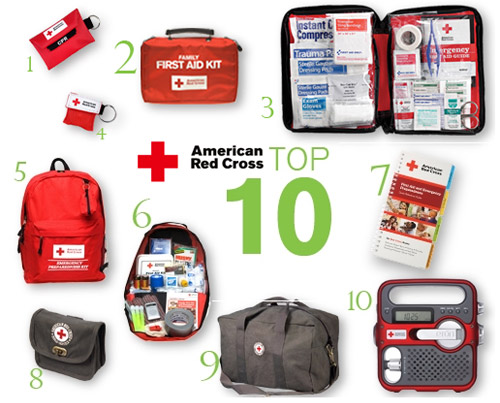
Last but not least, don’t forget to keep your kit updated. You’d hate to break into your kit during an emergency and find spoiled food, last year’s prescriptions, and clothes that no longer fit the kids. Try checking your kit every year at Daylight Savings (when you also check your smoke detector batteries).
#2. Make A Plan– Making a plan takes nearly no time or money, so it’s something we should all try to do. It involves gathering some info, writing it down, and reviewing it with everyone in your household. The goal is make sure everyone has the right information and follows the same steps when a disaster comes rolling down the street (hopefully not literally). A plan should include:
- Phone numbers for everyone in the family (be sure to include office, cell, and land line numbers)
- The phone number of an out-of-town relative. Local lines can be unpredictable during a disaster, so it’s best to designate one out-of-town relative that everyone should call to check in with. That also helps local lines clear for emergency personnel to use.
- Also, keep in mind that it’s often easier to text than make a call during an emergency. Plus, most phones will try to send a text until it goes through so you don’t have to repeatedly place calls.
- A pre-determined meeting place outside of your neighborhood in case you can’t get home (a church, school or shopping center works)
You can a get a plan form to fill out here at Ready.gov.
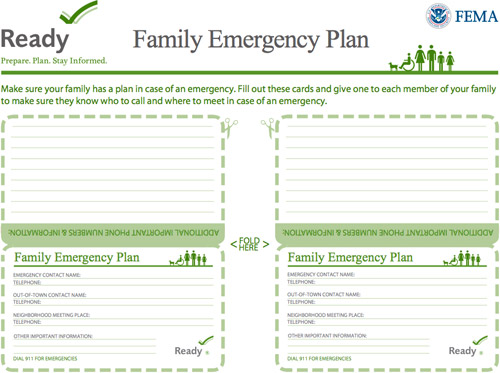
#3. Stay Informed – This is also a fairly easy one and it’s basically about making sure you know how to access updated information – like weather conditions (where is the storm headed?) and where to go for emergency relief (like where shelters are being set up). So learn what websites and radio stations broadcast local information (like our county sends updates on AM 1630). This is also where having a battery-operated radio and/or a NOAA weather radio comes into play.
Additional Links: If you want more information, the U.S. government operates a central website called Ready.gov with lots of info. You can also hunt down one for your states or county for more specific, regional information. In Virginia we’ve got VaEmergency.gov
Thanks Amanda and Michelle for imparting their knowledge on us all! It’s definitely been a good reminder to us Petersiks that we need to double-check some of our supplies and put together a plan.
Psst – Since many of you are thoughtful enough to ask about how our neighbors are doing since the tree fell on their house during Irene, we’re happy to report they moved back in at Christmas (yep, nearly 4 months later!) after having extensive repairs and renovations done to make their house liveable again. Nearly half of the roof frame had to be removed and reconstructed so it was quite the project – but they made lemonade out of their lemons and had the contractors rebuilt the two bedrooms on the affected end of the house into one big master suite. We actually got a peek at it before it was finished and it was looking awesome.
Psssst – Images from Ready.gov and Redcrossstore.org.
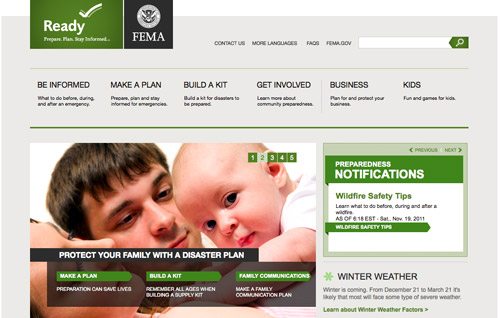

Elizabeth @wakeandgather says
We’re from the coast (Alabama & Florida) so we dealt with hurricanes every year. Most of the time we just had to ransack wal-mart a few days before landfall :)
Penni McNamara says
I totally laughed out loud when I saw this on pinterest today. I can see it on Clara’s art table now! FYI…I have no idea how to post a link to this…hope it works. Needless to say it’s jars with painted small animals on the lid. Have a great trip!
http://pinterest.com/pin/106890191125812207/
YoungHouseLove says
So cute!!
xo,
s
Tania says
Welcome to Portland…was really hoping to meet you guys, but we can only make it to the show this weekend.
YoungHouseLove says
Aw thanks Tania! I’m sure we’ll meet someday!
xo,
s
Amelia R. says
Try to take Miss Clara to OMSI while you’re in P-town; you’ll all love it!
Sarah R. says
Good advice, but I’d like to add to keep a full tank of gas. When the blackout happened a few summers ago, I learned just how far I could go with no cash (just credit/debit cards) and 1/4 tank of gas. Not far considering most gas pumps weren’t working. You never know when you might have to leave town in case of emergency.
james malone says
Last year I took a CERT (community Emergency response team) class it was and they had a lot of really good information as to what to do in the event of an emergency, you give up one night a week for a month but in the end you get so much more out of it! http://www.citizencorps.gov/cert/
YoungHouseLove says
Thanks for all the tips guys! So helpful.
xo,
s
Alexis Peck says
very well said! i live in eastern NC and we got hit very hard with this past hurracain. and we had just about everything we needed… but you dont really know what you need till you have been threw it. so in the middle of candle light skipbo we were making a list of things we SHOULD have had :)
Rachael says
My only advice is to the Govt….get the frickin’ electricity lines under the ground! We live in the NY burbs and came from the UK. I find it completely alien, even after years of living here, that the minute the snow falls, or the wind blows or it rains a little bit hard, the power goes out…….20 miles away from one of the most important cities on the planet. And while I’m at it, the cell phone coverage is appalling too.
Oh, one more thing! Don”t panic!
Jessika says
Welcome to Portland and the West Coast! Sorry for the weather expected the next few days. Please come back in the summer. I swear it’s so gorgeous that it makes up for the bit of rain we get in the winter. GORGEOUS (and no humidity) and green.
Lynn @ SafeBeauty says
So I hope that you guys landed safely and the flight didn’t completely wipe you out, although I’m sure it did. My bit of advice for speaking engagements is not to visualize anyone in their underwear (cause that can backfire in a major way) but rather that if you are the type that don’t like to look strangers down while talking then (if possible) train your eyes upon empty seats in the room. That way it will appear that you are making great eye contact but no one is really the wiser. I doubt you will have any empty seats but use this if you do, or if you don’t then look at blank parts of the walls near seated people. Works like a charm.
My best, Lynn
YoungHouseLove says
Ha- thanks for the tip! I usually end up staring down one or two people and at the end when I meet them I say “so sorry I was giving you that stare-down!”
xo,
s
Valeria says
Regarding ‘Important Documents’: As long as you are making copies make 1 extra set and send it to a family member or trusted friend who lives in a different city. It may be easier to contact them for this vital information than get into your bank safe deposit box if there has been a disaster in town.
Kirsten says
I live on Vancouver Island on the Westcoast of Canada, and apparently we’re due for a big one any day now. (Hope it’s not while you’re out here.) I just took on Emergency Preparedness as the program coordinator at my daughter’s school and in the last 4 months I have learned a ton. We’re prepping to have our new 20ft sea container stocked and ready for an unveiling during National Emergency Preparedness Week May 6th-12th. At this time we will also promote the 72hr idea for personal preparedness. It’s amazing how few people even think about preparedness but, in the event of a major emergency, the simple steps you mention above could make a huge difference to how things go for ourselves and within our communities. I’m glad to see this post. It’s something we should all consider.
Izzy says
Surely your readers would understand if you didn’t post twice a day or respond to comments while traveling? It would certainly have made your trip less stressful – and maybe more enjoyable?
Hope you have fun anyway.
YoungHouseLove says
Thanks Izzy! We just love chatting with you guys- and actually have plans to take a real vacation this year (in which we’ll do a total radio silence thing) – this is just a business trip so we’re trying to stay connected!
xo,
s
Bobby says
We don’t get anything in this part of the world (England!) except an apparent tremor (that nobody actually feels). I’ve been told about mini tornadoes hitting the coast but never actually going inland because they’re so weak. Anyway, an interesting read nonetheless, I suppose you never know..
HerLateNightCravings says
Thanks so much for this post! I’m going to forward it to my hubby now. This is a project he has been talking about and now he has a good jumping off point! And to be honest, I thought he was overreacting a little about having kits until that last hurricane we had here in Richmond. Being without power and seeing all of those tress down…scary! And that’s nothing compared to what other states get…man!
Thanks guys!!
Jayme @ Her Late Night Cravings
Brittanie says
I need to make a backpack or something of emergency stuff, one that’s better stocked… I got very scared when recently everything around me was burning up and people were losing their homes (I live in Austin, near Bastrop TX, where we’ve seen the worst drought in the nation’s history this past summer). It seemed like everyone around me was taking the whole thing very lightly, and not having packs ready in case they had to evacuate in the night or very quickly. I was especially worried about our cat and pup, since they obviously can’t know what’s happening or defend themselves!
It’s pretty sad/scary how little people think and prepare for emergency situations. I think it’s just another one of these “I’m invincible” delusions people have, thinking it won’t happen to them… It seems like there ought to be more of an emphasis on things like this, and how no one is invincible to nature… So thanks for the post! You’re actually making it a reality to people that having a good home is not just about prettiness and cleanliness. It’s about taking care of your family in *every* way.
DivaCFO says
Hey John & Sherry! I liked this post so much that we decided to feature it on my blog, DivaCFO. Would love for you to check it out, hope you guys are having fun in Portland!
YoungHouseLove says
Thanks! We’re having a great time!
xo,
s
Brandy in Nashville says
Don’t know if this has been mentioned, but there might be a need for a can of white spray paint and at least one ceramic animal! Hehehe.
YoungHouseLove says
Ha!
-John